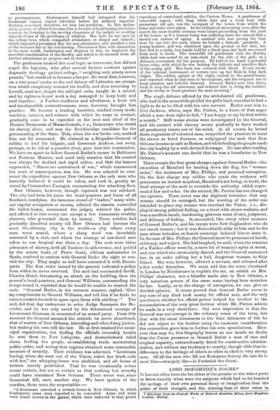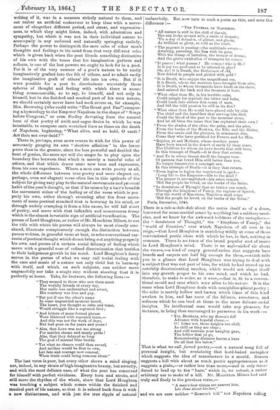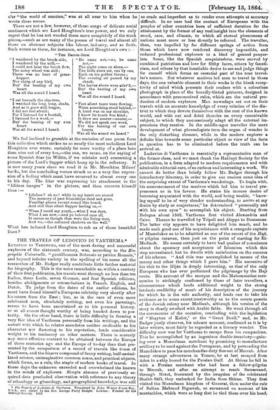LORD HOUGHTON'S POEMS.*
IT has not often been the lot either of the greater or the minor poets to know exactly what were the subjects which had so far touched the springs of their own personal fancy or imagination that the pulse of their thought, and the echoing beat of their verse in • Selections from the Poetical Works of Richard Nonektine Milne*, Lord Ifetightott. London : Murray.
ti,
writing of it, was in a measure strictly natural to them, and not rather an artificial endeavour to keep time with a move- ment of altogether different period, and stress, and expressive- ness, to which they might listen, indeed, with admiration and
sympathy, but which it was not in their individual nature to accompariy in any unforced and naturally springing melody. Perhaps the power to distinguish the mere echo of other men's thoughts and feelings in his mind from that very different echo which is given back when the poet blends something distinctive of his own with the tones that his imagination gathers and
reflects, is one of the last powers we ought to look for in a poet. For it is of the very essence of a poet's nature to be easily imaginatively grafted into the life of others, and to admit easily the imaginative graft of others' life into his own. But if it were possible for a poet to discriminate accurately those spheres of thought and feeling with which there is some-
thing commensurable, so to say, in himself, and not only in himself, but in the finished and musical part of his own nature, we should certainly never have had such errors as, for example, Mrs. Browning (who could write "The Great god Pan")compos- ing a hymnology to the Emperor Napoleon in the shape of " Songs
before Congress," or even Shelley deviating from the natural bent of that poetry of swift and eager desire in which he was inimitable, to compose such wretched lines as those on the death of Napoleon, beginning, "What alive, and so bold, 0 earth ? Art thou not over-bold ?"
There is, perhaps, even more reason to wish for this power of accurately gauging its own "elective affinities" in the lesser poets than in the greater, since the less powerful and decided the bent of genius, the more apt will the singer be to play upon the boundary line between that which is merely a tasteful echo of others, and that which draws some new tone and expression, from his own experience. Where a man can write poetry at all, the whole difference between true poetry and mere elegant (or, perhaps, even not elegant) verse often lies in this aptitude of the subject for giving easy play to the natural movements and personal habit of the poet's thought, so that if he misses by a hair's breadth the movement either of the feeling or of the verse which is pro- perly his own, either through straining after the freer move- ment of some poetical standard that is hovering in his mind, or through unduly cramping it from a like cause, he will fall short of poetry, and move with that inflexible and monotonous tramp which is the almost invariable sign of artificial versification. The
poems of Lord Houghton, or rather of Mr.Monckton Milnes, to use the title with which his poems will always be most closely asso- ciated, illustrate conspicuously enough the distinction between poems written, in graceful verse at best, to echo conventional cur- rents of poetical thought which do not bring out anything properly his own, and poems of a certain social delicacy of feeling which move with a graceful ease of refined discrimination that testifies to their indigenous growth in his mind. Lord Houghton's fancy moves in the poems of what we may call social feeling with the ease and music of a nature not only vivid but in harmony with itself, and which, on such subjects, can neither move ungracefully nor take a single step without showing that it is perfectly at home. Take, for instance, the following lines:—
" They seemed to those who saw them meet
The worldly friends of every day,
Her smile was undisturbed and sweet,
His courtesy was free and gay.
"But yet if one the other's name In some unguarded moment heard, The heart, you thought so calm and tame, Would struggle like a captured bird ; "And letters of mere formal phrase
Were blistered with repeated tears,—
And this was not the work of days, But had gone on for years and years !
"Alas, that Love was not too strong For maiden shame and manly pride !
Alas, that they delayed so long The goal of mutual bliss beside.
"Yet what no chance could then reveal, And neither would be first to own, Let fate and courage now conceal,
When truth could bring remorse alone."
The last verse is poor, but every other shows a mind singing. not, indeed, in any strain of high imaginative beauty, but sweetly, and with the most delicate ease, of what the poet has conceived for himself with perfect vividness. Every turn and stroke, and still more the rhythm of the whole, show that Lord Houghton was touching a subject which comes within the finished and musical part of his nature, so that it is echoed back from it with a new distinctness, and with just the true- ripple of natural melancholy. But now turn to such a poem as this, and note the difference :- "Trrs Foxariar. or Napormos.
"All nature is stiff in the chill of the air, The sun looks around with a smile of despair ; 'Tis a day of delusion, of glitter, and gloom, As brilliant as glory, as cold as the tomb.
"The pageant is passing—the multitude sways—
Awaiting, pursuing, the line with its gaze, With the tramp of battalion, the tremor of drums, And the grave exultation of trumpets he comes.
"It passes ! what passes ? He comes I who is He?
Is it joy too profound to be uttered in glee f Oh, no ! it is Death, the Dethroner of old, Now folded in purple and girded with gold !
"It is Death, who enjoys the magnificent car, It is Death, whom the warriors have brought from afar, It is Death, to whom thousands have knelt on the shore, And sainted the bark and the treasure it bore.
"What other than He, in his terrible calm, Could mingle for myriads the bitter and balm, Could hush into silence this ocean of men, And bid the wild passion be still in its den ?
" What other than He could have placed side by side The chief and tho humblest that serving him died, Could the blood of the past to the mourner atone, And let all bless the name that has orphaned their own ?
"From the shades of the olive, the palm, and the pine, From the banks of the Moskwa, the Nilo, and the Rhine, From the sands and the glaciers, in armament dim, Como they who have perished for France and for Him.
"Rejoice, ye sad Mothers, whose desolate years Have been traced in the desert of earth by their tears, The Children for whom ye have hearts that still barn, In this triumph of Death—it is they that return.
"And Ye in whose breast dwell the images true
Of parents that loved Him still bettor than you,
No longer lament o'er a cenotaph urn, In this triumph of Death—it is they that return.
"From legion to legion the watchword is sped- ' Long life to the Emperor—life to the dead !'
The prayer is accomplished—his ashes remain 'Mid the people he loved, on the banks of the Seine.
"In dominions of Thought that no traitor can reach, Through the kingdoms of Fancy, the regions of Speech, O'er the world of Emotions, Napoleon shall reign 'Mid the people he loved, on the banks of the Seine."
Paris, December, 1840.
There is a rub-a-dub-dub about the metre itself as of a drum, borrowed for some martial music by anything but a military musi- cian, and we know by the awkward baldness of the metaphors— the " dominions of Thought," the " kingdoms of Fancy," the "world of Emotion," over which Napoleon of all men is to reign,—that Lord Houghton is snatching wildly at some of those conventional poetic ideas with which lie has, in fact, nothing in common. There is no trace of the broad popular sort of' music in Lord Houghton's mind. There is an unfurnished air about the verses,—a kind of empty generalization that suggests bare boards and carpets not half big enough for them,—which tells you in a glance that Lord Houghton was trying to deal with a subject that was not part of him, for which lie had stored up no carefully discriminatiug touches, which would not shape itself into any growth proper to his own mind, and which ho had, therefore, to make to order, as it were,—that is, fit to a conven- tional mould and tune which were alien to his nature. It is the same when Lord Houghton deals with semiphilosophical poetry ; the echo is merely hollow and barren which ideas of this kind awaken in him, and has none of the fullness, sweetness, and softness which he can lend at times to the more delicate social insights. No intellectual mau would take any pleasure, for instance, in being thus encouraged to persevere in his work :— " Yet, Brothers, who np Reason's hill Advance with hopeful cheer,— O ! loiter not, those heights are chill, As chill as they are clear ;
And still restrain your haughty gaze, The loftier that yo go, Remembering distance leaves a haze On all that lies below."
That is what we call forced poetry,—not a natural 4ong full of personal insight, but containing that hard-baked metaphor which suggests the idea of manufacture in a mould. Reason suggests a hill with about as much poetic appropriateness as it suggests a plain,—or rather less than more,—and is only intro- duced to lead up to the " haze," which is, we submit, a rather arbitrary use to make of a hill. Mr. Mouckton Milnes had said
truly and finely in the previous verse,—
" A man's best things are nearest him, Lie close about his feet,"
and we are sure neither "Reason's hill " nor Napoleon ruling
o'er "the world of emotion," was at all near to him when he wrote these verses.
There are not a few, however, of those songs of delicate social sentiment which are Lord Houghton's true power, and we only regret that he has not weeded them more completely of the stock pieces,—such as are many of the poems of travel and almost all those on abstract subjects like labour, industry, and so forth. Such verses as these, for instance, are Lord Houghton's own :- - " Tom Baoox-Snm.
"I wandered by the brook-side, "He came not,—no, he came
I wandered by the mill,— not,—
I could not hear the brook flow, Tho night came on alone,—
The noisy wheel was still ; The little stars sat, one by one, There was no burr of grass- Each on his golden throne ; hopper. The evening air passed by my Nor chirp of any bird, cheek, But' the beating of my own The leaves above were stired,— heart But' the beating of my own
Was all the sound I heard. heart
Was all the sound I heard.
We feel inclined to grumble at the omission of one poem from this collection which strikes us as nearly the most melodious Lord Houghton ever wrote, certainly far more worthy of a place here than nine out of every ten,—the one, we mean, on the saying of some Spanish friar (to Wilkie, if we mistake not) concerning a picture of the Lord's Supper which hung up in the refectory. It is now many years since we read it in Mr. Monckton Milnes' books, but the concluding verses struck us as a very fine expres- sion of a feeling which must have occurred to almost every one in his day. The friar was expressing his attachment to the "lifeless images" in the picture, and then corrects himself thus :-
" Lifeless ? ah no ! while in my heart are stored The memory of past friendships dead and gone, Familiar places vacant round this board,
And still that silent Supper lasting on,— "When I recall my youth,—what I was then, What I am now,—and ye beloved ones all, It seems as though these were the living men, And we,—the coloured shadows on the wall."
What has induced Lord Houghton to rob us of those beautiful lines ?
"I sat beneath the elm-tree, I watched the long, long, shade, And as it grew still longer, I did not feel afraid; For I listened for a footfall,
, I listened for a word,—
But' the beating of my own heart Was all the sound I heard. " Fast silent tears were flowing, When something stood behind,— A hand was on my shoulder, I knew its touch was kind ; It drew me nearer—nearer,- We did not speak one word, For the beating of our own hearts Was all the sound we heard."
































 Previous page
Previous page